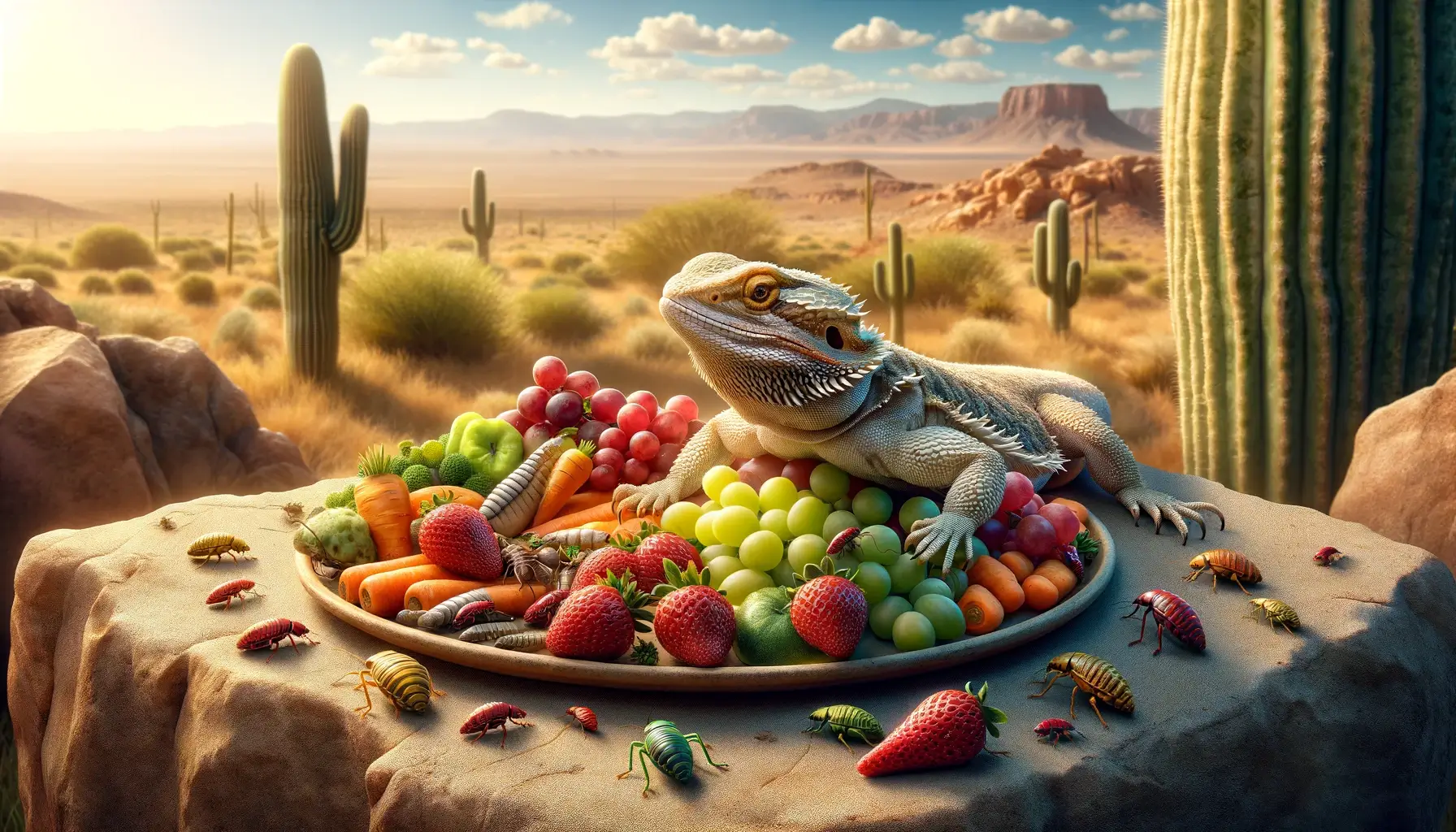Your bearded dragon’s diet is essential for their health and longevity. Their diet should primarily consist of vegetables, like collard greens and bell peppers. Proteins from insects like crickets and mealworms are also crucial for growth and tissue repair. Supplements of calcium and Vitamin D3 are essential for strong bones. Remember, feeding schedules and quantities vary depending on your dragon’s life stage. Avoid overfeeding and toxic foods to prevent health issues. Implementing these dietary tips can significantly enhance your dragon’s lifespan. Exciting nutritional insights await that will help you optimize your bearded dragon’s health even further.
Essential Nutrients for Bearded Dragons
While you might think feeding your bearded dragon is straightforward, it’s important to understand the essential nutrients they need for peak health and longevity. This is where a detailed bearded dragon food guide comes in handy. As an enthusiast, you value the freedom to provide the best care for your pet.
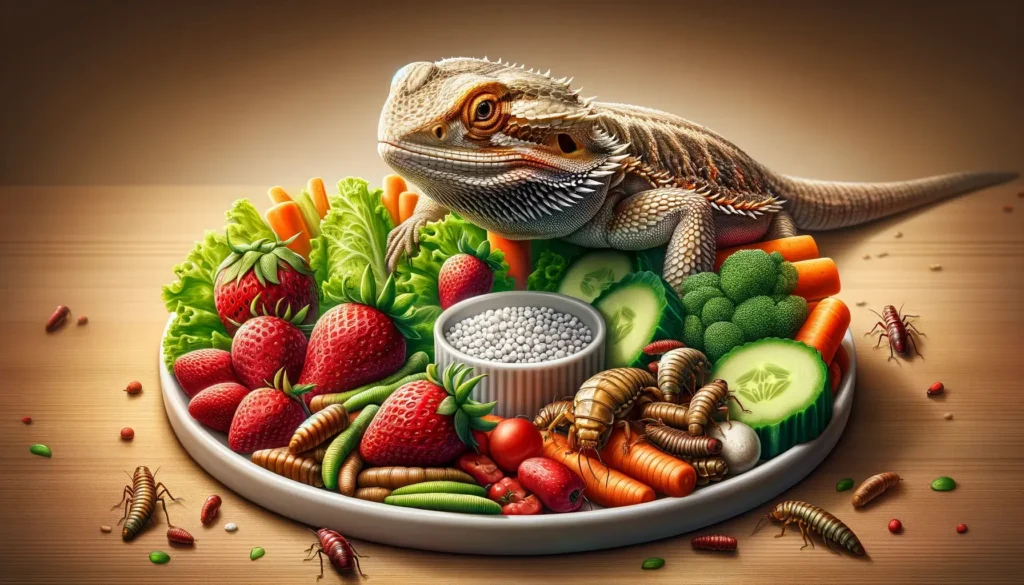
Firstly, proteins are vital in the bearded dragon food list. They’re the building blocks of their bodies, supporting growth and tissue repair. You should ensure that insects form a significant portion of their diet, especially for younger dragons.
Next, your bearded dragon’s food should contain ample vitamins and minerals. Calcium is essential for bone health, while Vitamin D3 helps in its absorption. A deficiency in these can lead to metabolic bone disease. Bearded dragon food supplements are a great way to ensure they’re getting enough.
Finally, your pet needs a good balance of fruits and vegetables for dietary fiber, aiding digestion and providing necessary antioxidants. Always remember that the best bearded dragon food is balanced and tailored to their age and health condition.
Understanding the nutritional needs of your bearded dragon is a critical step in ensuring their peak health and longevity.
Best Food Choices for Bearded Dragons
Exploring the menu of bearded dragon cuisine can be challenging, but knowing fundamental essentials and their benefits can simplify the process and guarantee your pet thrives. The best nourishment for bearded dragons includes a varied diet of vegetables, fruits, and live food.
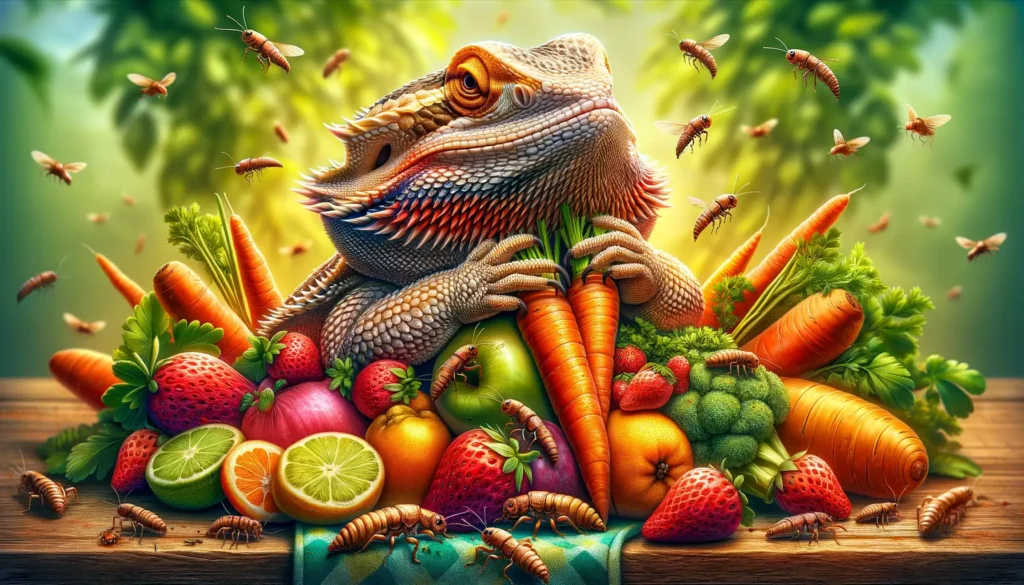
Bearded dragon vegetable nourishment should comprise around 70% of their diet. Critical choices include leafy greens such as collard, mustard, and turnip greens, and veggies like butternut squash and bell peppers. These offer a mix of essential nutrients like calcium and vitamins.
When it comes to live food, bearded dragons enjoy a range of insects, including crickets, mealworms, and waxworms. However, balance is key, as too many insects can lead to obesity.
To simplify your feeding routine, consider a bearded dragon food list PDF. This handy guide offers a detailed daily food list for bearded dragons, ensuring their dietary needs are met.
Feeding Schedule for Bearded Dragons
Establishing a consistent feeding timetable for your bearded dragon is crucial to ensure they receive the correct nutrients for optimal health and longevity. A dependable bearded dragon food schedule, customized to their age and size, can enhance their dietary intake.
You should provide five to nine small crickets or mealworms thrice a day for hatchlings. Juveniles need a bit less, with three to five feedings daily. Meanwhile, adults should eat once a day, with most of their diet consisting of vegetables.
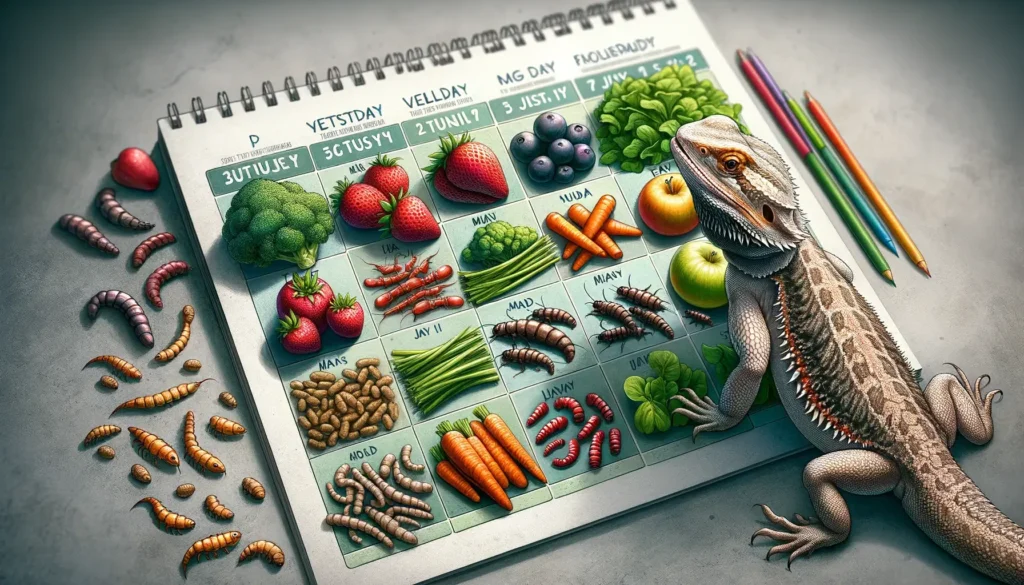
To better manage this, consider using a printable bearded dragon food chart for a daily routine. This can help you keep track of what and when your pet eats, ensuring a balanced diet. A weekly chart might also help vary the food items.
Avoiding Common Feeding Mistakes
To guarantee your bearded dragon’s health and longevity, it is essential to avoid common feeding mistakes that could endanger its wellbeing. Overfeeding is one such error. It’s tempting to ensure your pet isn’t hungry, but an overloaded bearded dragon food chart can lead to obesity and related health problems. Stick to a balanced diet and the correct portion sizes.
Be mindful of the type of food you’re offering. What food does a bearded dragon eat? It mixes insects, vegetables, and fruits, but some are toxic or hard to digest. Ensure you’re not feeding them avocado, rhubarb, or fireflies.
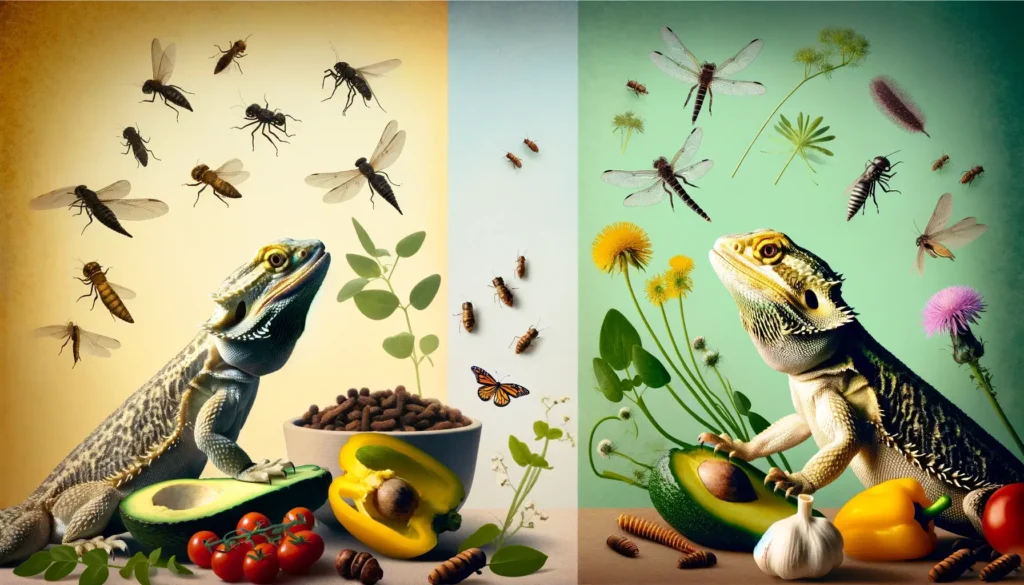
You might wonder, ‘ How long can a bearded dragon go without food?’ Stress less. They’re resilient creatures that can survive up to two weeks without food under certain conditions. However, regular feeding should be addressed.
Observing your bearded dragon not digesting food properly could indicate low enclosure temperatures or an inappropriate diet. Remember, how much food a bearded dragon eats varies with age and size. Younger dragons eat more insects, while adults need more plant matter. So, adjust accordingly.
Supplements for Bearded Dragons
In addition to a well-rounded diet, you’ll need to consider supplements to guarantee your bearded dragon receives all the nutrients for peak health. Supplements are an influential component of a bearded dragon food chart by age, ensuring your pet gets adequate vitamins and minerals at each developmental stage.
Calcium and Vitamin D3 supplements are paramount for healthy bone development and should be dusted onto insects before feeding. Calcium deficiency can lead to metabolic bone disease, a severe health issue in bearded dragons. Products like Fluker’s bearded dragon food and Repcal bearded dragon food are fortified with these essential nutrients, making them a good choice for supplementation.
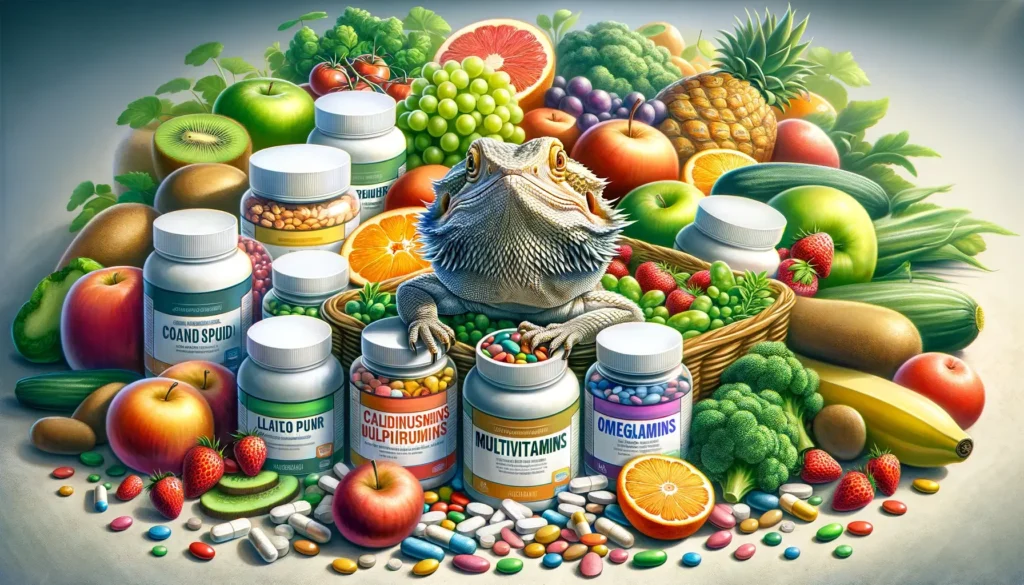
The best food for a bearded dragon includes a balanced mix of vegetables, fruits, and protein sources. However, a multivitamin supplement once or twice a week is essential to fill any nutritional gaps. Always provide a bearded dragon food bowl that’s shallow enough for your pet to access its food and supplements easily.
Incorporating these elements into your bearded dragon’s diet will ensure that it receives all the nutrients it needs for a healthy, long life. Remember, your pet’s health is in your hands.
The Impact of Diet on Longevity
Your bearded dragon’s longevity is greatly influenced by its dietary habits. A balanced, nutrient-rich diet is the cornerstone of a healthy, extended life. Scientific studies indicate that the best daily food for bearded dragons includes a mix of live insects, bearded dragon food veggies, and occasional fruits. This balance guarantees they receive the right proportion of proteins, vitamins, and fiber necessary for their wellbeing.
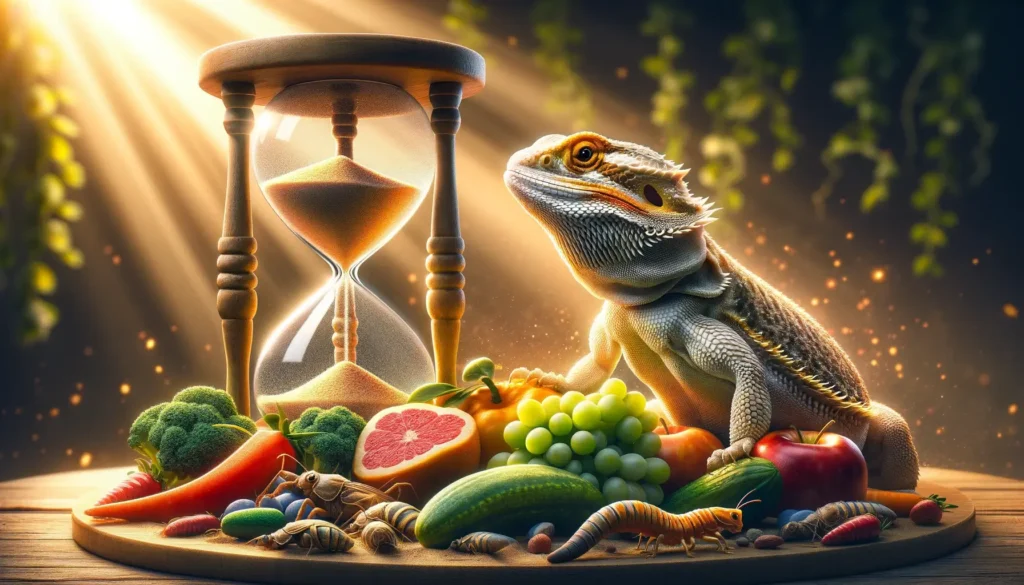
The bearded dragon’s favorite food is insects, especially crickets and mealworms. However, only serving them insects can lead to health issues like obesity and kidney disease. So, it’s crucial to incorporate fresh food like vegetables and fruits into their daily diet. Veggies like collard greens, squash, and bell peppers benefit their health.
Feeding your dragon a variety of foods not only enhances their health but also stimulates their appetite and natural hunting instincts. A diverse diet also prevents selective eating, a common issue in captive bearded dragons. Like humans, an improper diet can lead to health complications and a shorter lifespan. Hence, the key to your bearded dragon’s longevity is providing them with a balanced, nutrient-rich diet daily.
Dietary Considerations for Juvenile Bearded Dragons
Caring for a juvenile bearded dragon’s diet requires special attention, as its nutritional needs differ dramatically from those of its adult counterparts. Your responsibility is to provide the best food for a juvenile bearded dragon, which means a balanced mix of proteins, fruits, and vegetables.
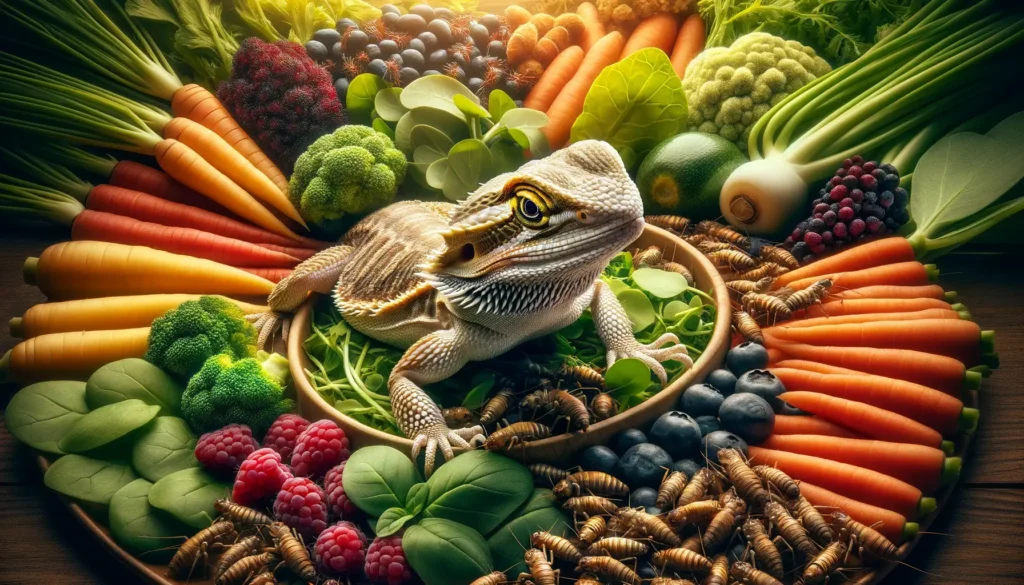
Consider these products:
Zoo Med Juvenile Bearded Dragon Food: It’s specifically formulated to meet their growth needs.
RepCal Juvenile Bearded Dragon Food: Containing all essential vitamins and minerals, it supports their ongoing development.
Homemade mix: A blend of soft-bodied insects and finely chopped fruits and vegetables can supplement commercial food.

